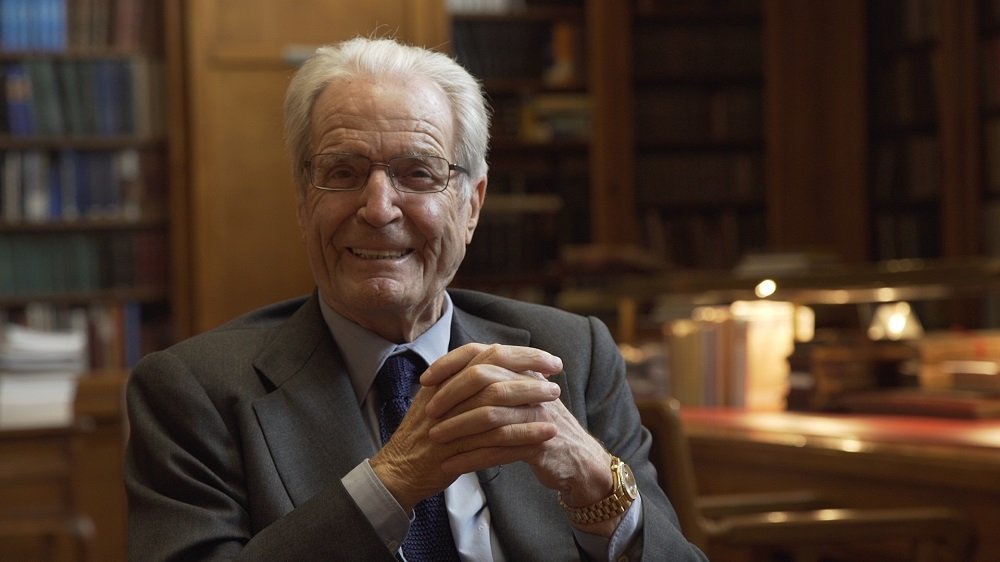[dropcap letter=”A”]
ntonio Garrigues Walker has spent a significant part of his life crossing the professional line of law and business to get carried away by his more artistic impulse in theatre, poetry and painting. As a playwright, his last work appeared in January 2017 in La Revista de Occidente with the title El Saber de Nuestro Tiempo (“The knowledge of our times”) but his vocation as a dramatist comes a long way. The first one that is remembered is To the politicians, dating from 1958. It reaches the sum of fifty-two pieces in total, and good part of his literary production has reached its maximum expression on the scenes, with performances by amateur theatre groups directed by himself for friends and family. Many remember the exclusivity of mythical representations in Sotogrande, but some works have been programmed in more important scenarios such as La Abadía, the Círculo de Bellas Artes, the Gran Teatro de Huelva or the Oporto Tívoli.
The characters elaborated by Garrigues are those of opera buffa. And with his author’s pen he does not elude the issues that really matter to him. In The Knowledge of Our Time gives the word to a tormented poet, hurt by sadness, and to an admirable prostitute to discuss the problem of the apparent disintegration of capitalism.
If something defines his entire trajectory, that is his strict vocation of public service, developed for so many years in the private sphere. This is also shown in his last drama, with characters that are so sad, tormented and torn that they shipwreck and drown in their loneliness. All of them have, in the end, the ambition to transcend, with their bitter testimony loaded with tons of irony, to change the world a little. Fortunately, when Antonio Garrigues is himself, he is affable and always finds a way out of restlessness. Always, in the end, there is an open door.
Luis María Ansón, who has followed him almost every August -when the theatrical premiere comes- that this poor man had to devote himself to other things in life. To earning money, he points out. Since he, definitively, has de the talent of a dramatist. His characters are those of opera buffa. And with his author’s pen he does not elude the issues that really matter to him. In The Knowledge of Our Time gives the word to a tormented poet, hurt by sadness, and to an admirable prostitute, to discuss the problem of the apparent disintegration of capitalism. To a young Syrian refugee and a to a European leader responsible for migration, to discuss migration and shelter. And, finally, a woman (an essentially human-based robot), and any man (unemployed and without a future), to discuss scientific and technological advances.
Antonio Garrigues visited Foment and was himself. Without interposed characters. Convinced that the market economy must generate fewer negative effects and reduce inequality.
Master of lawyers, he is in his work the result and the sum of so many other authors: Arnaud, Ionesco, Beckett, Buero and Sartre. Humour catches the anecdote and it falls, it sinks, frowning in its reflection on love, power, glory, life and death.
The literary exercise of facing theatrically the great issues that persist in the human being -to the point of knocking him down and make him believe and feel insignificant- this is something that Garrigues solves with the humour of laughter. As if he allowed himself in his writings to take the licenses for which there is no place in the law and the professional activity of jurist and great businessman. Master of lawyers, he is in his work the result and the sum of so many other authors: Arnaud, Ionesco, Beckett, Buero and Sartre. Humour catches the anecdote and it falls, it sinks, frowning in its reflection on love, power, glory, life and death. Nothing anodyne, since he stirs emotions, and his characters -acknowledging their experience and over-confident- show, somewhat angry, their willingness to transform everything that is ahead, even if they dissimulate their will with an apparent reluctance. The most natural thing is to believe that behind all of them, acting as a ventriloquist, is Antonio Garrigues Walker.
His political vocation cannot be ignored, it begins with his sense of responsibility for the public arena and collective good. He has chosen to participate in all of this from the enterprise and the exercise law. And for that reason, he says: “the profession of lawyer is not only to know the law, it is also about knowing how it is applied and how even if one is right, can also renounce to its application”. Nuances make the difference.
“We all have faith in the democratic system and we accept that democracy is not a system that makes all of us agree but rather allows us to coexist with disagreement. How? I do not contemplate another system than dialogue”
Because in fact he is interested, concerned and occupied by the great issues of humanity and therefore, and of course, this includes Spain. In this way, he concludes: “we all have faith in the democratic system and we accept that democracy is not a system that makes all of us agree but rather allows us to coexist with disagreement. How? I do not contemplate another system than dialogue. Is it possible to live in disagreement if it is not talking? I do not think so. The rejection of the dialogue as a principle, that I do not accept. I cannot accept it because it would mean losing faith in the democratic system. Spain has problems, but no more than other Western countries. I personally believe that we have less, and that we are in a better position to face it”.





















